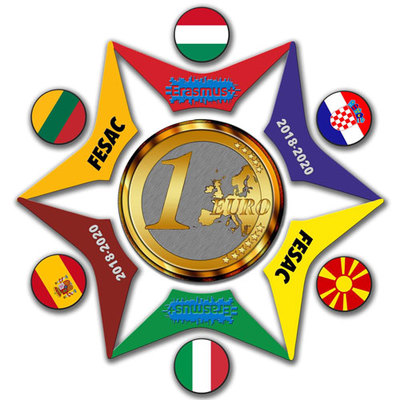Financial and Entrepreneurial Skills for an Active Citizenship
Motivation of the project
 With this project we intend to promote economic and financial education to equip the participating students from 13 to 18 years old with key knowledge and skills in order to foster future employability, socio-educational and personal development, as well as participation in civic and social life, to become capable of identify their attitudes and recognize the importance of financial education to become aspiring entrepreneurs.
With this project we intend to promote economic and financial education to equip the participating students from 13 to 18 years old with key knowledge and skills in order to foster future employability, socio-educational and personal development, as well as participation in civic and social life, to become capable of identify their attitudes and recognize the importance of financial education to become aspiring entrepreneurs.
Financial literacy is a basic life skill so the didactic activities will be structured within different disciplines that cover this area: Maths, Language, Business economics, Finance, History, IT, Civics.
The schools propose to promote this education as a curricular approach that integrates the disciplinary curricula with the long-term goal of creating a new informed, competent and responsible citizenship.
The combination of study sessions with practical, labour-oriented experiences, implemented through collaboration with external experts, will help to train students as they will move on from what they have learned up to the application of their knowledge and skills in experiences in which the mastery and the acquired competence appear clearly.
The activities are formulated in situations of real life and in different contexts such as in family, personal, social and working situations, in order to make the students aware of the importance that the financial instruments have in their daily lives and in the long run, in their working life.
The project will give students the opportunity to participate in training sessions in different working environments both in their country and in foreign countries, this will be a relevant and enriching experience for their education.
A transnational approach is important for the success of this project because it is based on the comparison and the exchange of cultures in a wide European dimension: each country will have a different perspective and a particular approach to the topic and students learn, through direct experience, other realities with which to share knowledge, abilities and skills.
Developing financial education in the European sphere, will also improve the skills, in English, of the specialised language of finance and the specific skills in Digital technology.
The teachers also share the ambition that this project can encourage the discussion at national and international level as a reference for a better quality of financial education at school.
The aim of the project is also to facilitate the learning and skills of our weakest students and to provide the most motivated and capable students to achieve more by participating in this project at the European level.
Funding this project also means responding to the European Parliament's Recommendation on the key skills of young people, accepting the OECD's 2005 requests and actions taken by several European national States. They all recall the need to invest in the financial education of young people.